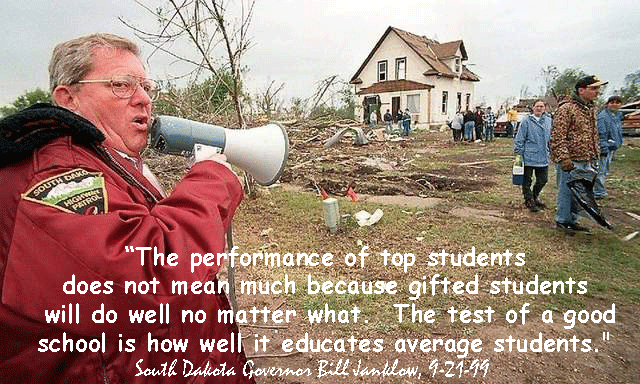Is Self-Study–Not Classroom–Best for Brightest Students?
 Schools and colleges might serve the social need of keeping kids off the streets and out of gangs. Both parents can leave the home for self-fulfillment at work, beefing up discretionary income. Yes, kids in college bring the unemployment figures way down, for administrators and faculty as well.
Schools and colleges might serve the social need of keeping kids off the streets and out of gangs. Both parents can leave the home for self-fulfillment at work, beefing up discretionary income. Yes, kids in college bring the unemployment figures way down, for administrators and faculty as well.
But education these days is a top-down exercise in federal statistical management, where the warning “Do not fold, bend, mutilate, or spindle” has long since been forgotten. Are schools now just warehouses, defined by the online dictionary as a “place for someone, typically a prisoner or a psychiatric patient, in a large, impersonal institution in which their problems are not satisfactorily addressed.”
The emphasis in all news reports now focuses on compulsory education for its own sake, as if motivated generations in the past weren’t able to use their K-8 basics seed as a springboard for lifelong self-study. Now students are thrown into the worst blackboard jungles (in inner cities) or forced to see outdoor recess moved inside to play behind expensive computer tablets.
But is the appetite for novelty and diversion the same as reading challenging books and working through proofs in math and science problems? No way to tell, now that testing itself is badmouthed as discriminatory and unfair. Maybe the same goes for all standards and measurement. It’s all about “going to school” and “getting a diploma,” with no lip service to learning at all anymore.
South Dakota Governor Bill Janklow was right when he said “The performance of top students does not mean much because gifted students will do well no matter what.” In other words, they can stay home or in the library to study on their own. Or does the “no matter what” mean that they should be held back in schools that are really there to cater to the bottom half of the student body?
In “Given Tablets but No Teachers, Ethiopian Children Teach Themselves,” MIT computer researcher Nicholas Negroponte, like all researchers today, knows that he’s both the problem definer as well as the problem solver. Money flows in and careers flourish so long as no one remembers what the “begging the question” fallacy was all about.
 Schools and colleges might serve the social need of keeping kids off the streets and out of gangs. Both parents can leave the home for self-fulfillment at work, beefing up discretionary income. Yes, kids in college bring the unemployment figures way down, for administrators and faculty as well.
Schools and colleges might serve the social need of keeping kids off the streets and out of gangs. Both parents can leave the home for self-fulfillment at work, beefing up discretionary income. Yes, kids in college bring the unemployment figures way down, for administrators and faculty as well.
